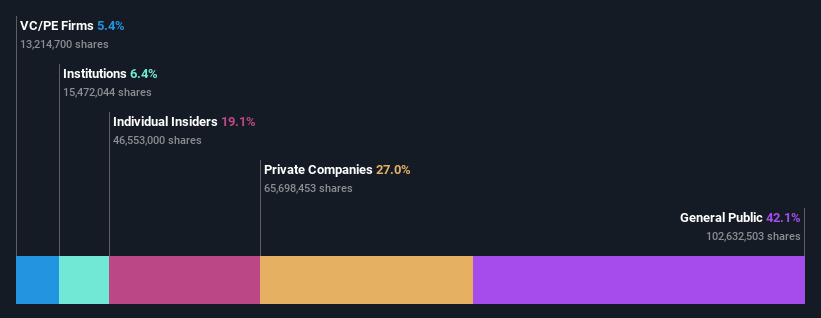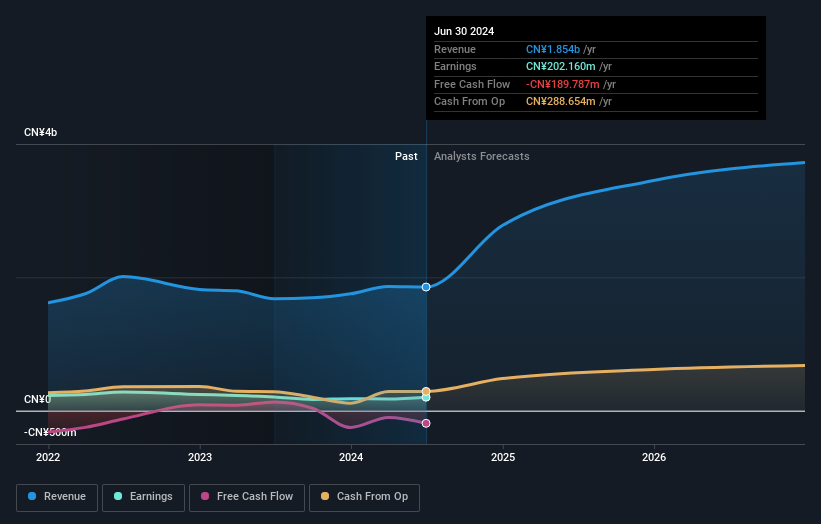- China
- /
- Commercial Services
- /
- SZSE:301305
Shenzhen Leo-King Environmental Group Company Limited's (SZSE:301305) market cap surged CN¥753m last week, retail investors who have a lot riding on the company were rewarded

Key Insights
- The considerable ownership by retail investors in Shenzhen Leo-King Environmental Group indicates that they collectively have a greater say in management and business strategy
- The top 10 shareholders own 50% of the company
- 19% of Shenzhen Leo-King Environmental Group is held by insiders
A look at the shareholders of Shenzhen Leo-King Environmental Group Company Limited (SZSE:301305) can tell us which group is most powerful. The group holding the most number of shares in the company, around 42% to be precise, is retail investors. In other words, the group stands to gain the most (or lose the most) from their investment into the company.
As a result, retail investors collectively scored the highest last week as the company hit CN¥4.4b market cap following a 21% gain in the stock.
Let's delve deeper into each type of owner of Shenzhen Leo-King Environmental Group, beginning with the chart below.
Check out our latest analysis for Shenzhen Leo-King Environmental Group

What Does The Institutional Ownership Tell Us About Shenzhen Leo-King Environmental Group?
Many institutions measure their performance against an index that approximates the local market. So they usually pay more attention to companies that are included in major indices.
Shenzhen Leo-King Environmental Group already has institutions on the share registry. Indeed, they own a respectable stake in the company. This implies the analysts working for those institutions have looked at the stock and they like it. But just like anyone else, they could be wrong. It is not uncommon to see a big share price drop if two large institutional investors try to sell out of a stock at the same time. So it is worth checking the past earnings trajectory of Shenzhen Leo-King Environmental Group, (below). Of course, keep in mind that there are other factors to consider, too.

Shenzhen Leo-King Environmental Group is not owned by hedge funds. The company's largest shareholder is Shenzhen Jianyin Wealth Investment Holdings Co., Ltd, with ownership of 12%. With 6.3% and 5.9% of the shares outstanding respectively, Jianxiang Chen and Shenzhen Leoking Investment Partnership Enterprise (Limited Partnership) are the second and third largest shareholders. Jianxiang Chen, who is the second-largest shareholder, also happens to hold the title of Chief Executive Officer.
On further inspection, we found that more than half the company's shares are owned by the top 10 shareholders, suggesting that the interests of the larger shareholders are balanced out to an extent by the smaller ones.
While studying institutional ownership for a company can add value to your research, it is also a good practice to research analyst recommendations to get a deeper understand of a stock's expected performance. There is some analyst coverage of the stock, but it could still become more well known, with time.
Insider Ownership Of Shenzhen Leo-King Environmental Group
The definition of an insider can differ slightly between different countries, but members of the board of directors always count. Company management run the business, but the CEO will answer to the board, even if he or she is a member of it.
Insider ownership is positive when it signals leadership are thinking like the true owners of the company. However, high insider ownership can also give immense power to a small group within the company. This can be negative in some circumstances.
Our most recent data indicates that insiders own a reasonable proportion of Shenzhen Leo-King Environmental Group Company Limited. Insiders own CN¥844m worth of shares in the CN¥4.4b company. This may suggest that the founders still own a lot of shares. You can click here to see if they have been buying or selling.
General Public Ownership
The general public, who are usually individual investors, hold a 42% stake in Shenzhen Leo-King Environmental Group. While this size of ownership may not be enough to sway a policy decision in their favour, they can still make a collective impact on company policies.
Private Equity Ownership
With a stake of 5.4%, private equity firms could influence the Shenzhen Leo-King Environmental Group board. Some investors might be encouraged by this, since private equity are sometimes able to encourage strategies that help the market see the value in the company. Alternatively, those holders might be exiting the investment after taking it public.
Private Company Ownership
Our data indicates that Private Companies hold 27%, of the company's shares. It's hard to draw any conclusions from this fact alone, so its worth looking into who owns those private companies. Sometimes insiders or other related parties have an interest in shares in a public company through a separate private company.
Next Steps:
I find it very interesting to look at who exactly owns a company. But to truly gain insight, we need to consider other information, too.
Many find it useful to take an in depth look at how a company has performed in the past. You can access this detailed graph of past earnings, revenue and cash flow.
If you are like me, you may want to think about whether this company will grow or shrink. Luckily, you can check this free report showing analyst forecasts for its future.
NB: Figures in this article are calculated using data from the last twelve months, which refer to the 12-month period ending on the last date of the month the financial statement is dated. This may not be consistent with full year annual report figures.
New: Manage All Your Stock Portfolios in One Place
We've created the ultimate portfolio companion for stock investors, and it's free.
• Connect an unlimited number of Portfolios and see your total in one currency
• Be alerted to new Warning Signs or Risks via email or mobile
• Track the Fair Value of your stocks
Have feedback on this article? Concerned about the content? Get in touch with us directly. Alternatively, email editorial-team (at) simplywallst.com.
This article by Simply Wall St is general in nature. We provide commentary based on historical data and analyst forecasts only using an unbiased methodology and our articles are not intended to be financial advice. It does not constitute a recommendation to buy or sell any stock, and does not take account of your objectives, or your financial situation. We aim to bring you long-term focused analysis driven by fundamental data. Note that our analysis may not factor in the latest price-sensitive company announcements or qualitative material. Simply Wall St has no position in any stocks mentioned.
About SZSE:301305
Shenzhen Leo-King Environmental Group
Engages in the organic solid waste treatment business in China.
Excellent balance sheet and slightly overvalued.


